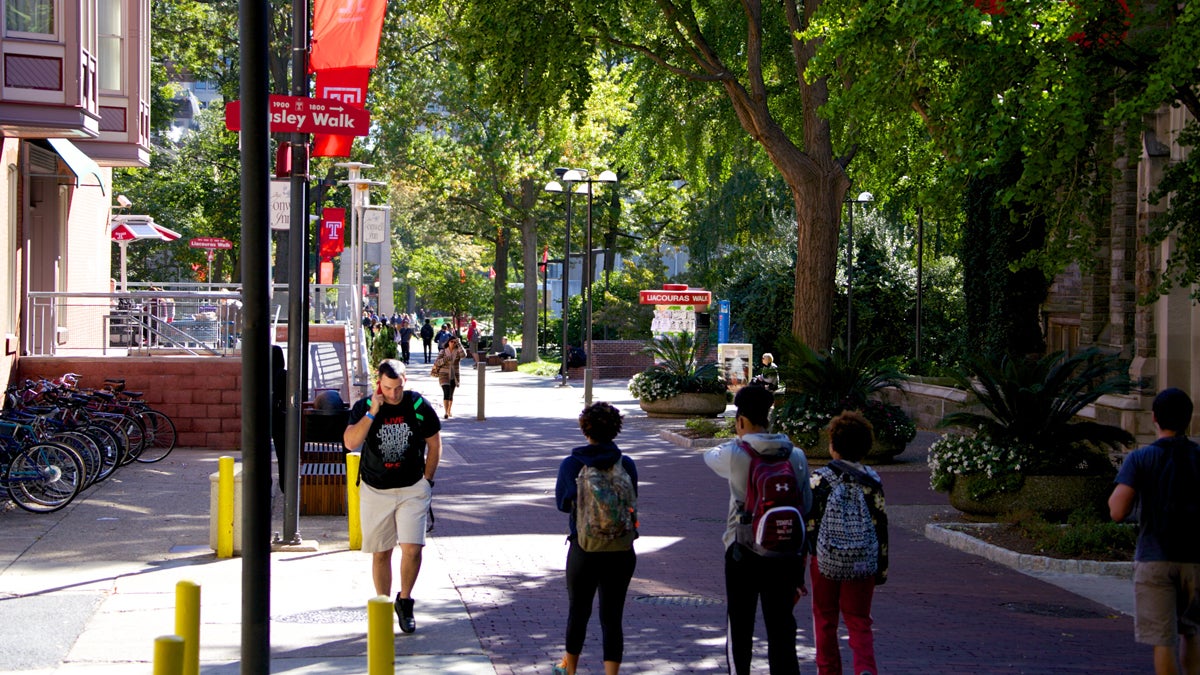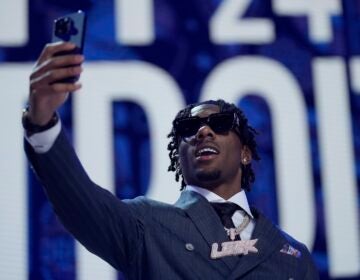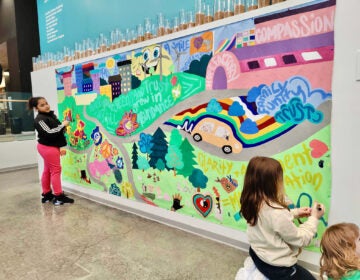When you know that the boy with a gun doesn’t really want to shoot you
Listen
The present-day Temple University campus, by daylight, is not nearly as frightening as it was one night 21 years ago for Billy Smith. (Nathaniel Hamilton/for NewsWorks)
Each month, NewsWorks presents a story from the First Person Arts Podcast. In this edition, a Temple grad and Philadelphia criminal attorney tells a story about the time he and a would-be criminal saved each other’s lives.
As part of a monthly series, NewsWorks presents this story from the Oct. 1 edition of the First Person Arts Podcast. It was told at a story slam, where true-life stories are presented around a theme, no notes allowed. The theme that night was “criminal.”
Billy Smith, a Philadelphia criminal defense attorney, tells a story about the time he and a would-be criminal saved each other’s lives.
Let’s take you back to 1992. I’m a freshman at Temple University. It is midterms. I am trying to keep my scholarship. I am at the library. It’s one in the morning, and yeah, there’s a shuttle, and yeah, my girlfriend lives on campus, but I’m tired. I just need to walk. I decide to leave.
I walk out of the library. I walked past the bell tower, what’s now Liacouras Walk. I’m walking down there, it’s brick, there’s trees. And I see one guy sitting on one academic building, and another guy sitting on another academic building.
Now, I’m from Colorado originally. I had been in Philadelphia for about four years prior to that, so my Spidey-sense was a little off. And I realized a little too late that I was in a little bit of trouble.
So, as I’m walking down the mall, I see a kid walking toward me. No older than 14 or 15. He gets five feet away. He holds a nickel-plated 44.
I stand there, my life flashing before my eyes.
He stands there, shaking like a leaf. He didn’t want to be there.
Now, we are in North Philadelphia, but I’m not going to entertain any stereotypes. So, for the purposes of this story, they could be Khalil and Jamal — or Raoul and Juan. I’m gonna call them Biff and Moishe. Moishe had the gun. Biff was the heavy.
Now … I have a bag. And Moishe says in a shaky voice, “Give it to me, give it to me.”
Biff runs behind him. “What’d you get, son?”
“I don’t know yet.” says Moishe, still shaking.
I say, “Listen guys, I don’t know where you guys went to school of criminality but, you’re robbing a black guy on a public school campus. What do you think I have?”
I empty my bag, say, “You could sell these books. I’ve got a pick with a fist on the end of it. You can have that. Here’s a meal card. You can have that. Just let me go.”
So, then this weird dance occurs between myself and Moishe. Moishe says, “Wait a second. Hold your head up.”
Biff says, “Cap this bitch! F*** him. Get your first body!”
Moishe says, “Wait, wait, wait, wait, wait. Chill, chill. Yo, where do I know you from?”
He’s trying to save my life. He didn’t know me, I didn’t know him. First thing that came to my mind, I was like, “Um, do you play basketball?”
Moishe says, “Yeah, yeah, yeah, yeah. I play ball. I play ball.”
“You play ball at — uhh, Nicetown Boys’ Club?”
Now, Nicetown Boys’ Club doesn’t have a court. I was just pulling out of thin air. And he says, “Yeah, yeah, yeah, yeah, yeah. What’s your name again, son?”
“Uh … Khalil?”
“Yeah, cool, cool, cool,” he says. “I can’t rob this dude. I can’t rob this dude.”
Well, Biff isn’t convinced. “Nah, nah, nah. He’s seen our faces, yo. You gotta cap him.”
Moishe’s like: “Nah, nah, nah. He’s cool. He’s cool. Chill, chill.”
Biff says, “How do you know him, again?”
I said, “Well … I … I dunked on him at Nicetown Boys’ Club!”
Moishe goes — I kinda punked him in front of his friend — he’s like: “You never dunked on me, kid!”
I was like: “Oh. My bad. Somebody else, somebody else.”
So, uh, long story short. I go back to my dorm after they allow me to collect my stuff, and I did Moishe a solid. I could’ve called the cops. I could’ve had them canvas all of North Philadelphia to find this young man. But that young man wasn’t a criminal. That young man was a boy who was hungry, a boy who lacked education, a boy who needed some guidance, and I wasn’t going to be the one responsible for changing his life.
Billy Smith graduated from high school and college in Philadelphia before attending law school in New Hampshire. When he graduated, he returned to Philly to serve with the Philadelphia District Attorney’s Office.
Today Smith is a criminal defense attorney and head of the criminal litigation division of Bowman & Partners, Ltd. We asked him some questions about his reactions to that night with “Moishe” and “Biff.”
What led you to decide to practice criminal law?
Interestingly enough, I began my career as a prosecutor primarily because I wanted to engage in public service after graduating from law school. Secondarily, I wanted to be in a courtroom advocating for people and issues as opposed to pushing paper.
How did you stay so calm and focused while being held at gunpoint?
I managed to stay calm because I knew from the look in Moishe’s eyes that he had no desire to shoot me. We were in that moment together and completely reliant upon each other to get out of that situation together.
At the end of your story, you explain why you didn’t call the cops. How does that philosophy influence your work as an attorney?
Technically, what Moishe did was illegal, but in reality (the reality of a 19-year-old), it was an inconvenience, because he had no desire to hurt me or himself. Moishe was not a “criminal” that night.
When I was a prosecutor, this experience didn’t necessarily influence my decisions. However, the defense attorneys who represented defendants would often share information regarding their clients (often first-time offenders), and based upon the facts and circumstances of a particular case, that information influenced offers that may have been made on that case for that particular accused man or woman.
Now, as a defense attorney, I find myself advocating on behalf of young men and women who are accused of crimes in this commonwealth. Many of my clients have not graduated from high school. Many of my clients live in impoverished areas. Many of my clients grew up without very much parental guidance. Many of my clients are “Moishe.” My goal is to offer competent, compassionate legal counsel to each and every one, with the hope that (regardless of outcome) these men and women come out of the other side of the dark tunnel of justice having not hit the walls of the tunnel.
—
Billy Smith can be found on Twitter: @Phillycounsel.
WHYY is your source for fact-based, in-depth journalism and information. As a nonprofit organization, we rely on financial support from readers like you. Please give today.




